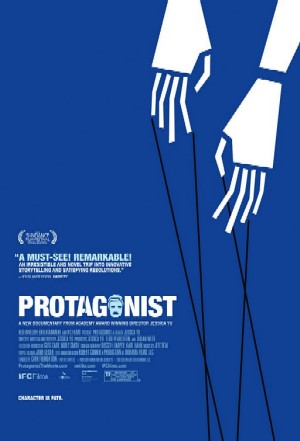
Jessica Yu’s 2007 documentary Protagonist chronicles the lives of four men to reveal how absolute certainty is a form of psychological blindness that can entail devastating consequences. In a spare, Errol Morriseque approach, Yu sticks mostly to upper-body shots of the men, who tell their stories directly to the camera, beginning with childhood and extending into their formative traumas and the consequent fallout of these traumas. Yu uses film or video of the men from outside sources at times (news reports, surveillance video, home video, cable access shows, etc.), but the major conceit for dramatizing or reenacting the men’s stories comes from her use of wooden puppets. These wooden puppets are dressed in ancient Greek theater garb, including two-faced masks; the puppet segments are set in a miniature Greek theater. In addition to the puppets who play act parts of the interviewee’s stories, there is a Greek chorus which introduces each chapter of the film by reciting lines from Greek tragedies that correlate directly to the men’s lives. While these lives never directly intersect, Yu deftly crafts her film to show how each person, as the protagonist of his own life, must course a trajectory against the curse/blessing of family, history, and social conditioning. While the men share certain phenomena in their pasts—abusive parents, strict religious upbringings, early childhood traumas—it’s their search for ultimate, authoritative certainty that most unites them. Each man quests for identity, and along the way is challenged, experiences epiphany, dreams of apotheosis, and achieves eventual catharsis. The search for certitude eventually blinds each man; as the film concludes, each subject recounts how absolute certainty—the absence of doubt—is precisely what leads to unthinking, inhumane actions. The film ends with one interviewee paraphrasing Socrates’ famous dictum: I only know that I know nothing.
I’ve omitted so far exactly what specific details make these men’s lives so hideous, so odious, so fascinating, so redemptive—so worth watching. Namely: What did these four dudes actually, like, do in their lives that is worth 90 minutes of your time? I was lucky enough not to know such details going in to the film, and I think that there couldn’t be a better way to see it. Each man tells his life story, beginning in youth; the stories become increasingly shocking as they progress. With this in mind, I strongly recommend you see Protagonist and skip the rest of the review, which contains SPOILERS.
The four men in the movie are Hans-Joachim Klein, Mark Pierpont, Joe Loya, and Mark Salzman. Klein is probably the most famous—he was a German terrorist who worked with Carlos the Jackal—but Joe Loya garnered his own notoriety as a bank robber. Mark Pierpont became an “ex-gay” evangelist, only to eventually come out of the closet again. Salzman’s story is perhaps not as sensational as the other three, although he definitely provides some of the funniest lines in the documentary (his inclusion in the film may or may not have something to do with his being married to the director). As a kid, Salzman was constantly bullied and tormented, which led him to study martial arts. The only problem was that he studied under a particularly sadistic master, another bully of sorts. I’ll let Salzman describe his initial attraction to the power and control (and violence) of this man—
Salzman’s attraction to violence was obviously rooted in being bullied as a youth. Klein and Loya also experienced early trauma—both were bullied by their parents. Klein was beaten by his father, a cop and closet-Nazi, who undoubtedly saw the boy as a vile reminder of his dead wife, who committed suicide only a few months after the boy’s birth. Loya’s mother died from a disease when he was very young, and his father—a church elder and deeply religious man whom the boy worshiped like a second God—began savagely beating Loya and his younger brother, claiming that he wished they had died instead of their mother. After a beating that left him with broken bones and a concussion, Loya stabbed his father. This clip from the film is deeply disturbing, the kind of real horror story that shows us why Oedipus Rex still resonates today (and tomorrow)—
Loya longs to recapture the the rush of having believed he murdered his father. He finds this feeling by robbing banks. Raised a devout Christian with no room for shades of grey in his moral purview, he embraces evil, declares himself Nietzsche’s Übermensch, and begins a spree of terror.
Klein begins his terrorism after joining the youth movement in Germany in the late sixties. Initially, he’s attracted to the group because they provide meaning, direction—certitude—in his life—
Over time—and many terrorist actions, including one ending in several deaths—Klein becomes disillusioned with the movement, seeing that their specific targeting of Israelis seems to recapitulate the exact totalitarian, Nazi horror that he had initially sought to speak out against.
Each of the men experiences eventual disillusionment, which is the inevitable outcome of the intensity with which each approaches the anchoring idealism that is the center of his life. Here, Mark Pierpont shows the stress of attempting to align himself with the demands of his ideals—
It is through each man’s disillusionment that he is able to find peace, and even a modicum of wisdom and a measure of redemption. Spare and understated, the film delivers this message without preachiness; it never asks us explicitly to view the limiting, blinding function that absolute certainty might play in our own lives, or to apply it to our current political, social, or religious leadership. Instead, Protagonist makes its case more clearly and strongly by showing in real, concrete terms the devastating effects that absolute certainty entails, even as the film acknowledges just why absolute certainty holds such psychological and spiritual attraction in an age of complexity, absurdity, and violence. Highly recommended.
